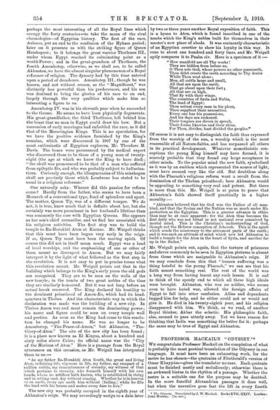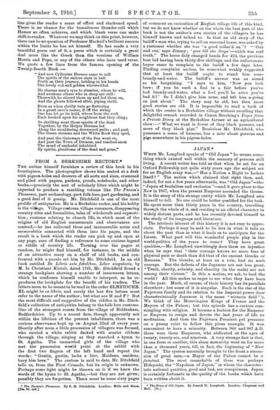PROFESSOR MACKAIL'S "ODYSSEY."*
WE congratulate Professor Mackail on the completion of what is probably the most poetical translation of the Odyssey in our language. It must have been an exhausting work, for the metre he has chosen—the quatrains of FitzGerald's version of Omar Khayyim—gives the translator no ease. Each quatrain must be finished neatly and melodiously; otherwise there is an awkward hiatus in the rhythm of a passage. Whether the metre is a suitable one for the purpose may be doubted. In the more fanciful Alexandrian passages it does well, but when the narrative goes fast the lift in every fourth • The Odyssey. . Transle.- 'led by J. W. Mackail. xfoolia. Loinien :
line gives the reader a sense of effort and slackened speed. There is no chance for the tumultuous thunder-roll which Homer so often achieves, and which blank verse can make shift to render. Whatever we may think on this point, however, there can be no question of Professor Rackail's brilliant success within the limits he has set himself. He has made a very beautiful poem out of it, a poem which is certainly a great deal more like the Greek than the versions of William Morris and Pope, or any of the others who have used versa We quote a few lines from the famous opening of the Twenty-fourth Book "And now Cyllenian Hermes came to call The spirits of the suitors slain in hall Forth on their journey, holding in his hands The lovely rod and golden wherewithal He charms men's eyes to slumber, whom he will, And awakens others who in sleep are still : Therewith he stirred them up and led them on, And the ghosts followed after, piping shrill.
Even as when shrilly bate go fluttering In a great cave's recess, if off the string One has let go its hold, where from the rock Each hooked upon his neighbour fast they cling; So shrilling went those spirits of the dead Together, by the Helper Hermes led Along the mouldering downward paths; and past The Ocean streams and the White Rock they sped, And past the Gateways of the Sun went on,
And past the Town of Dreams, and reached anon The mead of asphodel inhabited By spirits, phantoms of the dead and gone.'











































 Previous page
Previous page